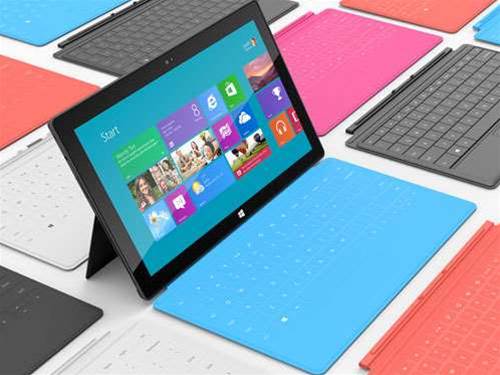Microsoft kept its PC hardware partners largely in the dark about plans to launch a competing tablet computer, according to people with knowledge of the matter.
The secrecy that shrouded the Surface tablet ahead of its launch this week marked a departure from the software company's tradition of working closely with hardware companies to test and fine-tune every new product.
It also underscores Microsoft attempts to mimic elements of Apple's strategy, keeping its cards close to the vest as it works to reinvent its Windows franchise and jump into the hardware business.
But the move risks alienating Microsoft's partners, some of which only learned of the new gadget days before its unveiling,
The earliest Microsoft's partners were told about the tablet was last Friday, just three days before it was shown to the media at an event in Los Angeles, according to sources in the US and Taiwan technology industry who spoke on condition of anonymity.
Windows chief Steven Sinofsky made a round of telephone calls but gave only the barest details on Friday, neither revealing the name of the gadget nor its specifications, two people close to Microsoft's partners told Reuters.
As such, Microsoft's main partners remained "in wait-and-see" mode and had to monitor the news for details, one of the sources said.
Microsoft chief executive Steve Ballmer told reporters the company had informed its largest hardware-manufacturing partners about the tablet. A company spokesman declined to say how much of a heads up the partners were given, or to elaborate further.
Sources at Acer and Asustek, the world's fourth and fifth largest PC makers respectively, said the first they had heard of the new tablets was at Ballmer's news conference on Monday.
"No senior executives heard about the news last week," said an Acer executive, who added they were still seeking details.
"We're quite surprised."
Acer shipped nearly ten percent of PCs in the first quarter of 2012, with Asustek accounting for six percent, according to research house IDC.
The Surface marks a major strategic shift for Microsoft, ahead of the expected release of its new Windows 8 operating system by the fourth quarter of this year.
Microsoft is now pitting itself as a direct competitor, breaking with a 37-year old model where it had licensed its software to original equipment manufacturers (OEMs) such as Dell or HP, which made the machines.
That some of Microsoft's partners were not told beforehand about the Surface has led to a "sense of betrayal" in the industry, according to one source.
"This has always been a point of contention between OEMs and Microsoft -- Microsoft getting into the hardware space," a second source said.
Competing head-on with PC makers may damage a relationship that has long dominated the computer world, where nine out of 10 PCs run on Windows. Analysts pointed to similar concerns in the Android smartphone world surrounding Google's acquisition of Motorola.
"The strategy may affect the willingness of device manufacturers to work so closely with Microsoft, as it will now be viewed as a competitor as well as a partner," said Andrew Milroy, vice president of ICT Research for Asia-Pacific at Frost & Sullivan in Singapore.
Driving Microsoft's shift, say analysts, is the growing clout of Apple, whose iPad is threatening the market for notebook computers. Notebooks are still largely a Windows business, but its growth is a fraction of the tablet market.
Knew in advance
Microsoft has long worked closely with its partners, who analysts say pay up to ten percent of their material costs to license the Windows operating system.
HP declined to comment on whether it was given advance notice of the Surface, as did Dell.
"We remain committed partners to Microsoft. We remain committed to Windows 8, and we will have a Slate product at the time of launch," a Dell spokesman said.
China-based Lenovo also declined to comment except to say "Microsoft has been and will continue to be one of Lenovo's most valued partners".
Microsoft has not revealed how much it will charge for the two Surface tablets.
While the cheaper, ARM-based version of the tablet would likely compete with the iPad, the beefier Intel version could compete with the latest generation of ultrabooks, a relatively new category of laptops heavily marketed by Intel.
Ballmer said only that the tablets would be competitive in price with rival products.
"The big question is whether Microsoft puts out some sort of introductory pricing designed to seed the market or insists on making full margin on the device," said Jan Dawson, chief telecoms analyst at Ovum in New York.
"However, it risks alienating OEMs even further if it prices lower than they are able to."
While pricing is a sensitive issue, more damaging may be the lack of warning the partners say they had from Microsoft. Ovum's Dawson said Microsoft was giving its OEM partners "a huge vote of no confidence" and they would "rightly feel slighted".
An executive at a Chinese handset maker, who didn't want to be identified because of the sensitivity of the issue, said: "It'll be a good strategy for Microsoft to focus on software development and leave its partners to make the hardware."
(Additional reporting by Clare Jim in Taipei, Miyoung Kim in Seoul and Bill Rigby in Seattle; Writing by Jeremy Wagstaff in Singapore; Editing by Neil Fullick, Edwin Chan and Tim Dobbyn)










_(28).jpg&h=140&w=231&c=1&s=0)





 iTnews Benchmark Awards 2026
iTnews Benchmark Awards 2026
 iTnews Executive Retreat - Security Leaders Edition
iTnews Executive Retreat - Security Leaders Edition
 iTnews Cloud Covered Breakfast Summit
iTnews Cloud Covered Breakfast Summit
 The 2026 iAwards
The 2026 iAwards












_(1).jpg&h=140&w=231&c=1&s=0)



